India's 1,000th ODI: 10 matches to remember
- Published
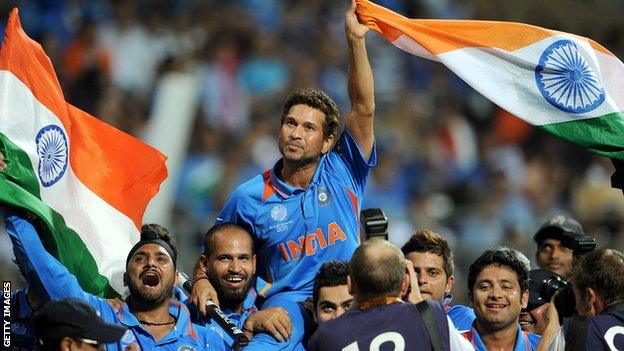
India have won the 50-over World Cup twice - in 1983 and 2011
On Sunday at Ahmedabad's Narendra Modi Stadium, India will become the first country to play 1,000 one-day Internationals, when they take on West Indies. Here, sports journalist and author Gulu Ezekiel looks back at 10 of the best.
1: The world champions are beaten
29 March 1983: India 282-5 (47 overs: Gavaskar 90, Kapil Dev 72) beat West Indies 255-9 (47 overs: Richards 64, Dujon 53*) by 27 runs. Man of the match: Kapil Dev.
The Albion Sports Complex at Berbice, Guyana, is where it all began.
Home to West Indian legend Rohan Kanhai and a sizable population of 'East Indians' (immigrants from India), India pulled off what Kanhai himself described as a "nearly unbelievable achievement".
India had been well beaten in the first ODI at Port of Spain three weeks earlier and were 1-0 behind in the Test series as well after two matches. There was no indication a mighty upset was on the cards.
But with opener Sunil Gavaskar leading the way with 90 and captain Kapil Dev crashing 72, India ran up a formidable total of 282-5.
Despite three half-centuries, West Indies were always behind the rate, making it the first time India had beaten the twice world champions.
2. Kapil Dev's miracle in Kent
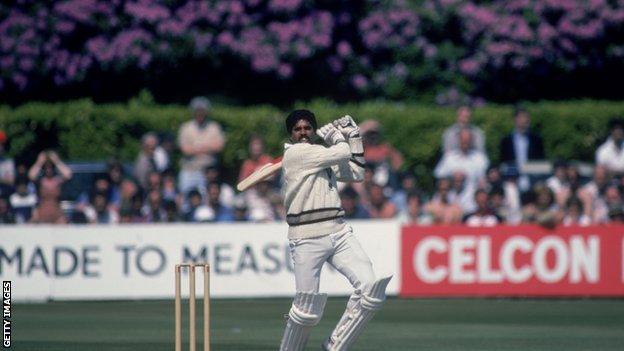
Kapil Dev's 175 not out from 138 balls broke the record for the highest score in ODIs
18 June 1983: India 266-8 (60 overs: Kapil Dev 175*) beat Zimbabwe 235 (57 overs: Curran 73) by 31 runs. Man of the match: Kapil Dev.
India began their 1983 World Cup campaign with a bang, dealing defending champions West Indies their first defeat at Old Trafford in a repeat of Berbice.
Two days after their opening match, India also defeated Zimbabwe, themselves shock winners over Australia on the opening day, but then were beaten in turn by Australia.
With each team playing each other twice, India had to beat Zimbabwe and improve their net run-rate to make the next match against Australia a virtual semi-final.
Batting first, India were reeling at 9-4 on a damp green top which gave the Zimbabwe medium pacers plenty of assistance.
Captain Dev walked in and soon it was 17-5 but Dev took charge and with valuable support from the lower order, he smashed the bowlers to all parts of the picturesque Tunbridge Wells ground, ending with a world record 175 not out.
"Everything I tried came off. I kept blasting the attack," he said.
It was the decisive innings that kept India in the hunt.
3. The miracle World Cup final win
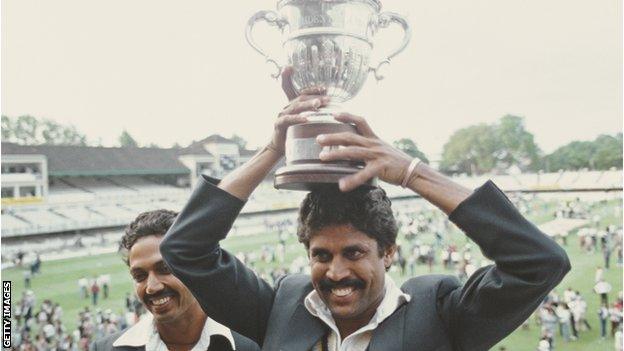
India's World Cup win in 1983 was a significant upset with runners-up West Indies having won the tournament's two previous editions
25 June 1983: India 183 (54.4 overs: Srikkanth 38) beat West Indies 140 (52 overs: Richards 33) by 40 runs. Man of the match: Mohinder Amarnath.
It was the miracle at Lord's, the result that turned the world of cricket upside down.
Twice-world champions West Indies, who had lost a solitary match in the World Cup, were surely destined to make it a glorious hat-trick under the captaincy of Clive Lloyd.
Having lost their tournament opener to India, the champions crushed the same opponents in the return match at The Oval and easily disposed of Pakistan in the semi-final.
Chasing 184, once Viv Richards sauntered in and began to take the bowling apart, it seemed all over.
Call it arrogance, hubris, cockiness, what you will but one careless pull off Madan Lal saw Kapil sprinting to take an astonishing catch over his shoulder and the King was gone - "the most historic catch of my life" in Kapil's words.
The gentle medium pace of Mohinder Amarnath, Roger Binny and Madan then removed the cream of the West Indies batting and from 76-6 they collapsed to 140 all out.
"It was an amateurish performance, we got carried away after dismissing India cheaply," said the crestfallen Lloyd.
India were champions against all odds and the world of cricket would never be the same again.
4. Another trophy in the bag
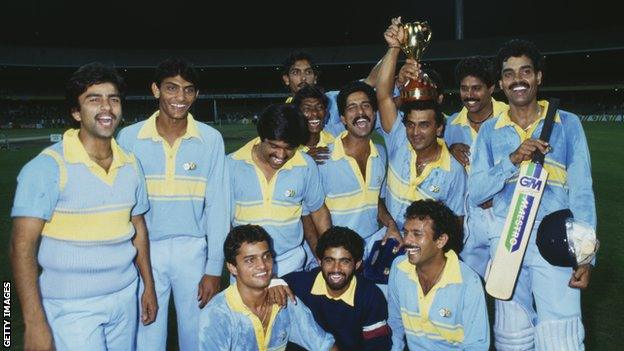
Ravi Shastri, who would later become India coach, was named player of the tournament
10 March 1985: Pakistan 176-9 (50 overs: Miandad 48) lost to India 177-2 (47.1 overs: Shastri 63*, Srikkanth 67) by eight wickets. Man of the match: K. Srikkanth.
The World Championship of Cricket (WCC) was staged in Australia in 1985 to mark the 150th anniversary of the state of Victoria with all the top nations participating.
Sometimes known as the 'mini-World Cup', it had surprises galore, none more so than when Pakistan beat West Indies in the semi-final to make it an all-Asia final against arch-rivals India.
The reigning World Cup champions were on a roll, winning all their group matches with ease, first against Pakistan, then England and Australia.
New Zealand were trounced in the semi-final at Sydney, with Laxman Sivaramakrishnan and Ravi Shastri proving spinners could play a major role in ODIs.
In the final, Pakistan crumbled to 176-9 with Kapil Dev taking three wickets, but leg-spinner Sivaramakrishnan claimed the prize scalp of Javed Miandad.
Shastri and swashbuckling opener Krishnamachari Srikkanth once again provided a grand start as India waltzed to victory by eight wickets.
Sunil Gavaskar had announced prior to the event he would be quitting the captaincy at the end and he did so in grand style and was surely justified in claiming India were now one of the top one-day sides in the world.
5. Arch-rivals Pakistan dismissed for 87
22 March 1985: India 125 (42.4 overs: Azharuddin 40, Imran Khan 6-14) beat Pakistan 87 (32.5 overs: Dev 3-17). Man of the match: Imran Khan.
In 1984 India had won the Asia Cup in Sharjah and a year later they were back in the desert just after the Melbourne triumph to participate in the Four-Nation Cup with Pakistan, England and Australia.
The opening match pitted the WCC finalists against each other, always the main draw in Sharjah.
India, perhaps still feeling the after-effects of that title triumph, were routed for 125 thanks to a deadly spell of 6-14 by Pakistan fast bowler Imran Khan. Only Mohammad Azharuddin and Kapil Dev showed some resistance and Pakistan's supporters in the crowd were already celebrating.
But once again it was India's bowlers who came to the fore: Kapil, Shastri and Sivaramakrishnan combined to skittle out Pakistan for a measly 87.
That remains the lowest total successfully defended in a full ODI.
India defeated Australia in the final to make it four titles between 1983 to 1985, cricket's equivalent of the Grand Slam.
6. Tendulkar downs Australia in the desert
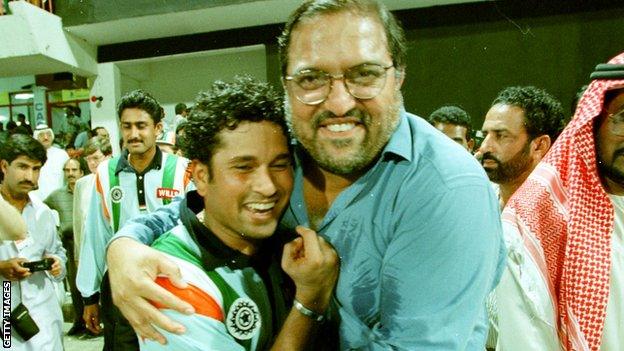
Tendulkar's 'Desert Storm' innings is considered one of his best in ODIs
22 April 1998: Australia 284-7 (50 overs, Bevan 101*) beat India 250-5 (46 overs, Tendulkar 143) by 26 runs (revised target). Man of the match: Sachin Tendulkar.
The 'Desert Storm' innings brought the world of cricket to its feet and the Australia bowling to its knees.
The year 1998 was a golden one for Sachin Tendulkar and it was at Sharjah that he displayed his brilliance in two remarkable innings.
The Coca-Cola Cup was a triangular series, New Zealand the third team involved.
In their second match against Australia, India had to win to stay in the hunt for a final place with Australia already through.
Batting first, Australia raced away to the highest total in the tournament, a formidable 284-7. To reach the final on net run-rate India needed to score 254.
Things were looking bleak at 143-4 in 31 overs when a fierce sandstorm stuck.
"The wind was so strong I feared my five-foot-four-inch frame would get blown away," said Tendulkar.
With 25 minutes lost the innings was restricted to 46 overs and to win India now needed another 94 from 15 overs to reach the final.
"It was [at this stage] I decided not to let the Australian bowlers settle," said Tendulkar.
By the time he was out for 142 from 131 balls, India had reached the final though they lost the match.
Two days later on his 25th birthday, Tendulkar was at it again. His 134 sealed victory in the final for India.
7. Ganguly celebrates on the Lord's balcony
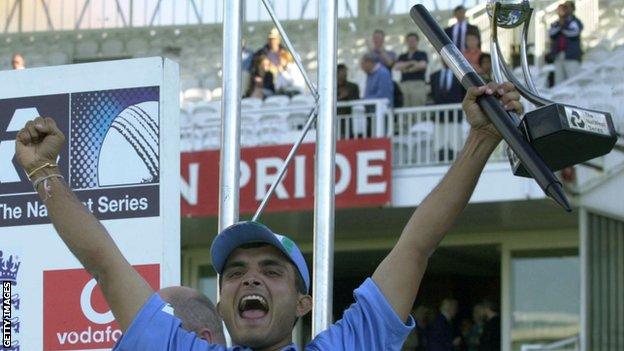
India's successful chase of 326 was the second highest in ODIs at the time
13 July 2002: England 325-5 (50 overs: Trescothick 109, Hussain 115) lost to India 326-8 (49.3 overs: Ganguly 60, Yuvraj 69, Kaif 87*) by two wickets. Man of the match: Mohammad Kaif.
Sourav Ganguly had a point or two to prove when he captained India for the first time in England in 2002. So did England skipper Nasser Hussain.
The two sides were in the final of the NatWest triangular tournament.
England's massive 325-5 was built around centuries by Hussain and Marcus Trescothick and things looked hopeless for India when Tendulkar fell at 146-5.
But Mohammad Kaif and Yuvraj Singh turned things around with a stand worth 121 at better than a run a ball. Kaif, with 87 from 75 balls, saw India home by two wickets.
Ganguly took off his shirt and waved it triumphantly above his head on the Lord's balcony, just as Andrew Flintoff had done a few months earlier in Mumbai.
Though considered an iconic moment in Indian cricket, "it's something I could never live down," said Ganguly.
8. Tendulkar hits first ODI double hundred
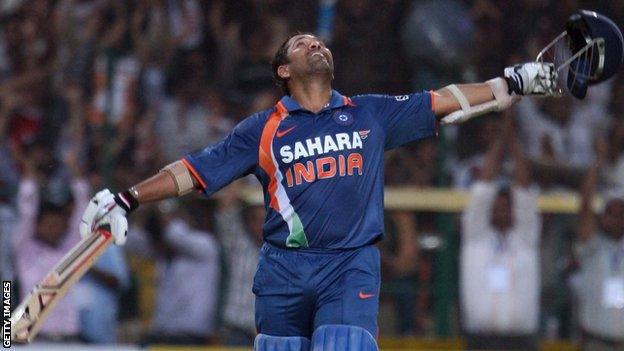
Tendulkar hit 25 fours and three sixes in an unbeaten 200 off 147 balls
24 Feb 2010: India 401-3 (50 overs: Tendulkar 200*, Karthik 79) beat South Africa 248 (42. 5 overs: De Villiers 114*) by 153 runs. Man of the match: Sachin Tendulkar.
Thirty-nine years after the first ODI and in the 2,962nd match, a batting feat never achieved before finally occurred. Perhaps fittingly the honour fell to Sachin Tendulkar, one of the all-time greats.
It was in the royal city of Gwalior that the king of Indian cricket became the first to score a double century.
The day did not start well though with Tendulkar's body showing the strains of a long season, the physio having to work extra hard to get him match fit.
"It was only after I passed 175 that I started to think about a double hundred," said Tendulkar.
After some tense moments with Dhoni hogging most of the strike towards the end, the landmark was reached in the final over and cricket history had been made. Despite a century by AB de Villiers, India won at a canter.
9. Dhoni seals World Cup win in Mumbai
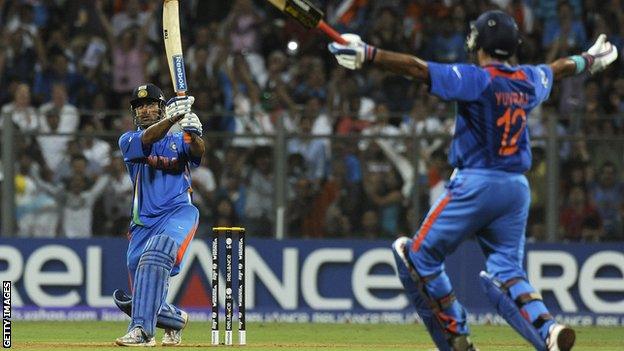
The 2011 win was India's first in the World Cup since 1983
2 April 2011: Sri Lanka 274-6 (50 overs: Jayawardene 103*) lost to India 277-4 (48.2 overs: Gambhir 97, Dhoni 91*) by six wickets.
It was the shot seen and heard round the world - captain MS Dhoni smashing seamer Nuwan Kulasekara for the six that sealed the World Cup for India in 2011.
Even as the packed Wankhede Stadium heaved with excitement and non-striker Yuvraj Singh ran to embrace him, 'Captain Cool' did just that - kept his cool.
With Sri Lanka running up a challenging 274-6, things were nervy for India at 114-3 in the 22nd over.
Dhoni had struggled for runs until the final but he took a gamble and walked in ahead of the in-form Yuvraj.
The India captain steadied the ship alongside opener Gautam Gambhir (97) and remained calm amid the rising tension to end 91 not out.
10. Kohli becomes Tendulkar's successor
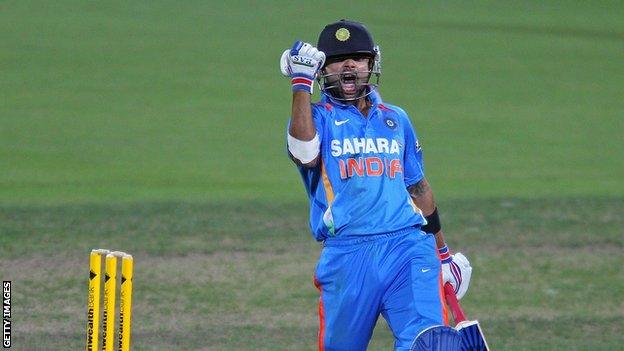
Kohli scored 133 not out from 86 balls to lead India to a stunning win
28 Feb 2012: Sri Lanka 320-4 (50 overs: Dilshan 160, Sangakkara 105) lost to India 321-3 (36.4 overs, Kohli 133*) by seven wickets. Man of the match: Virat Kohli.
Virat Kohli had played 81 ODIs by early 2012 but it was his swashbuckling unbeaten 133 at Hobart in the tri-series match against Sri Lanka that helped elevate him to the mantle of successor to Sachin Tendulkar.
It also elevated him to the vice-captaincy at the age of 24.
India's task was enormous. They needed to overtake Sri Lanka's 320 in 40 overs to gain a bonus point and stay alive in the tournament.
Kohli's brilliance ensured India reached the target in 36.4 overs.
"I decided to give it my all," he said. "We took it like two T20 games. That was our plan and we executed it."
A star was born.

Is this the ultimate test of endurance? How a rower with incurable cancer broke an Atlantic record
This Is Going To Hurt: Ben Whishaw stars in an adaptation of Adam Kay's hit memoir of life as a junior doctor
